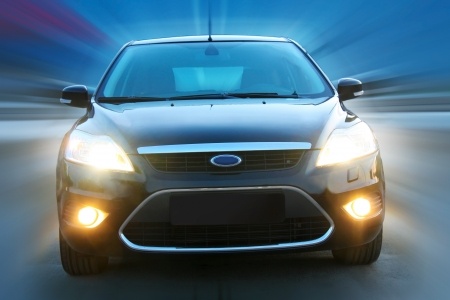CAR BULB REPLACEMENT NEAR YOU
Ensuring your car's lights work properly is critically important. Not only does it help you see better at night and during bad weather, but it also makes sure other drivers can see you. In short, keeping your lights in good shape helps you avoid accidents, pass your MOT, and communicate clearly with other drivers on the road—and we’re here to help you stay bright and visible at all times.
Light up the road ahead with First Stop's bulb replacement services. Use our store locator to find your nearest First Stop and let’s get started.
Why replace your car’s bulbs?
Replacing your car's bulbs isn't just about ticking off an item on your car servicing checklist. More importantly, it's about keeping everyone safe on the road.
- Good lighting means you can spot hazards early, and other drivers can spot you too. It’s all about avoiding those close calls.
- Working headlights, brake lights, and indicators are a legal requirement on the road and when it comes to your MOT.
- Whether you’re turning, stopping, or warning about a hazard, your lights help you communicate with other drivers without saying a word.
When should I replace my car bulbs?
The signs of car bulb failure are relatively easy to spot. If your headlights start to dim and aren’t lighting up the road as well as they should, it's a clear indication that their effectiveness is decreasing. Similarly, if you notice an indicator or brake light blinking faster than usual, it usually means one of the bulbs is on its way out and needs attention.
It's also smart to replace your bulbs before long journeys to avoid the inconvenience of a bulb failure while you're away from home. Seasonal checks are also a good practice, especially as you head into winter months when days are shorter and you'll rely more heavily on your vehicle's lighting.

How to check your car bulbs
It’s easy to check your car bulbs and stay safe on the road. Here’s a quick step-by-step guide to ensure your lights are always in top shape:
- Start clean: Give your headlights and taillights a good wipe. Dirt and grime can make them seem dimmer than they are.
- Light them up: Turn on your car and switch on all your lights. Don’t forget your brake lights, turn signals, and reverse lights.
- Walk around: Take a stroll around your car to inspect each light. Look for any that are dimming or not working.
- Brake check: For brake lights, you might need a friend to press the pedal while you look. If you’re on your own, you can use a reflection off a wall or window.
- Indicator relay: Turn on your indicators one at a time. A quick blinking might mean a bulb needs replacing.
What are the different types of bulbs used in vehicles?
In the world of vehicle lighting, three primary types of bulbs are widely used. Halogen bulbs are the traditional choice, known for their long service life and warm light. They offer a cost-effective solution that has been reliably illuminating roads for decades.
LED (light emitting diode) bulbs are the modern alternative, standing out for their energy efficiency and longevity. They provide a bright, clear light and have become increasingly favoured for their durability and lower energy consumption.
Finally, xenon/HID (high-intensity discharge) bulbs deliver a powerful white or bluish light, similar to natural daylight. These bulbs are typically found in high-end vehicles and are valued for their strong brightness and extensive coverage.
FAQs about car bulb replacement
How do I know when to replace car bulbs?
If they're not as bright as they used to be or if one stops working, it's time for a change.
Can you replace headlight bulbs with LED?
Yes, you can swap out traditional bulbs for LEDs, which offer brighter light and longer life. However, it's important to check that the LED bulbs are compatible with your vehicle's model and meet road safety standards.
What is a xenon headlight?
Xenon headlights, also known as high-intensity discharge (HID) lights, provide a brighter, more natural light compared to halogen bulbs. They are more energy-efficient and have a longer lifespan, making them a popular choice for high-performance and luxury vehicles.
Can car headlights be changed?
Absolutely, changing car headlights is a common maintenance task. While some cars make it easy to access and replace the bulbs yourself, others might require a specialist to navigate more complex assemblies.
Do they check headlights on MOT?
Yes, working headlights are a must-pass part of the MOT test. This is to ensure your headlights are aligned correctly and that both the high beam and low beam settings work as they should.
Should I replace both headlights if one goes out?
It's generally a good idea to replace both headlights at the same time. This ensures uniform brightness and colour, providing optimal visibility and preventing uneven wear.
Do I need to replace the whole headlight or just the bulb?
Usually, just the bulb needs replacing, which is a simple and cost-effective solution. However, if the headlight casing is damaged or the assembly is faulty, you might need to replace the entire unit. This ensures your headlights not only shine bright but are also positioned correctly for the best visibility and safety.
Bulb replacements at First Stop
Ensuring your vehicle's lights are functioning correctly is not just a matter of following the rules of the road; it's a crucial part of road safety that protects you and other drivers. By performing regular checks and understanding when and how to replace your car's bulbs, you'll contribute to safer roads for everyone.
If you’re not sure how to replace car headlight bulbs or you simply want a professional to get the job done right, pay a visit to your nearest First Stop Centre. Our experienced fitters can help pick the right bulbs for your car and fit them for you.